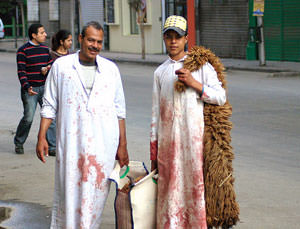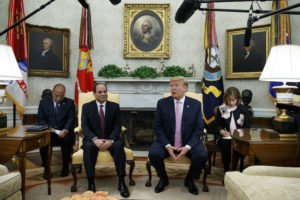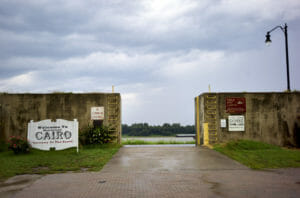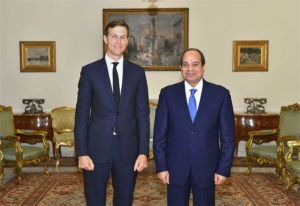Dispatches From Cairo: Feast of Sacrifice
The streets of Egypt ran with rivers of blood Sunday. It was the blood of sacrifice and not the blood of slaughtered humans this time.
We asked Lauren Unger-Geoffroy, an Arabic-speaking American who lives in Cairo, to share her perspective of life in Egypt after the revolution. In this entry, she writes about the first post-revolutionary Feast of Sacrifice.
CAIRO — The streets of Egypt ran with rivers of blood Sunday. It was the blood of sacrifice and not the blood of slaughtered humans this time. It was the slaughter of cows and sheep and goats for Eid al-Adha, the Feast of Sacrifice — the feast of Ibrahim (Abraham), the common father of the three major monotheistic religions who is said to have built the Kaaba at Mecca.
Every adult Muslim, male or female, who owns any form of wealth that is surplus to his or her basic needs is under an obligation to offer a ritual sacrifice. This could be a goat, sheep, cow or camel.
The meat must be divided into three parts. One part for the home, one part for relatives and friends, and one part for the poor and needy. Great care must be taken to distribute the meat equally.
The Eid spirit of charity runs high as every Muslim who sacrifices an animal is eager to share his or her meat with the poor. Since many here cannot afford to buy meat, they get to eat it just once a year — on Eid al-Adha. Some better-off families go so far as to dedicate several animals solely for feeding the poor and hungry on the three days of Eid. No Muslim goes hungry during the tiring but joyous days of Eid al-Adha.
In Muslim countries, animals are slaughtered everywhere on Eid al-Adha, including on roads and streets. (In non-Muslim-majority countries, animals can be sacrificed only at designated places, with prior permission from authorities.) The animals are slaughtered by bleeding. The blood should be allowed to drain completely from their bodies. This is why the streets fill with blood.
The children run around, excited by the activity and the new penny toys they have received. As in Eid al-Fitr, they get sweets and toys and families awake at dawn, bathe and put on new clothes to go to the Eid prayer, all calling out the takbeer together on the way: “Allahu Akbar Allahu Akbar (God is the Greatest, Allah is the Greatest!). Laa ilaaha illallaahu Allahu Akbar (There is no god except God, God is the Greatest!). Allahu Akbar wa lillaahil Hamd (God is the Greatest and for God is The Praise!).”
As soon as the prayer is finished, the sacrifices are made and people begin to divide and prepare the delicious meat feast. I see the eager (often unhealthy gray) faces of the street children and the market urchins and the beggars and the poor around here. Today they will feast like the rich people.
Later in the morning the scent of cooking meat fills the neighborhood and mingles with the fading smell of the slaughter as the gallons of blood are absorbed into the eternally thirsty dirt and sand of the streets.
In the afternoon the sounds of a few scuffles, undoubtedly about portions, have gone. Things have calmed, people are digesting their feast, and I go down to give candy to my little friends, daughters of the boweb (concierge) across the street. The men are sitting on one mattress on the dirt floor and the women on another. The three who know me smile and greet me happily when I lift the cloth that covers the doorway. They are drinking tea and chatting. There are five adults and four children in the small space; a couple of cousins are visiting from their village. Hoda’s dirty little face is beaming as she shows me her plastic candy dispenser, and her little sister, Amal, shakes hers to show me her new gift. They both seem more energetic than usual, and underneath the smudges I notice they have some color in their faces. Their mother is smiling too, and we joke about the people squabbling after praying, and people eating too much and farting, we all laugh, and other people around who have partaken in their Eid share of red meat also look noticeably healthier and relaxed.
Eid al-Adha is also the celebration of the completion of the Hajj, the weeklong pilgrimage to Mecca that all able Muslims are obligated to perform at least once during their life. Many save for years to go to Saudi Arabia for Hajj. This year there were 3 million people circling the Kaaba in their white, stitchless clothing, in unity, in peace and kindness, and in faith, experiencing the awesome spiritual sense of connection with history with all Muslims, with each other, with their faith and God. There is a big Udhiyyah in Mecca after the Hajj.
Eid al-Adha is usually a much gayer holiday, but this year the somber significance of the Feast of Sacrifice is lost on no one here. Egyptians cannot ignore the daily massacres that are going on now in Syria and Yemen. Brothers in Palestine, Libya, Tunisia, Bahrain — in every place that is in upheaval — are being slaughtered. And the people of Egypt have not forgotten for one second their own martyrs, sacrificed to our own struggling revolution. Some Egyptians have been trying to organize a global demonstration of solidarity with Occupy Everything for Nov. 12, but I haven’t heard about it lately.
This holiday has always been a bit difficult for me as a vegetarian and animal-empathic person … hearing the death wails and smelling the effluvia of animal fear hormones and blood and descending to red, red streets, sometimes ankle-deep in blood. But this year I was desensitized to some degree: I have seen humans killed and their bodies heaped and shoved and crushed in a way that the animals never will be. Sorry, sheep.
After the feast we will return to work and watching and trying to hang on to our revolution as the slip and slide of political parties and potential candidates continue. The claws of Egypt’s Supreme Council of the Armed Forces are well sunk in, and grow stronger by the day. Now, Mohamed Hussein Tantawi, SCAF commander in chief and de facto head of state, is being proposed as a candidate.
The presidential elections are not scheduled until July 2013. As we watch the vacillating popularity of the Muslim Brotherhood’s Freedom and Justice Party as well as other parties, anything is possible. We can only hope to learn this political game fast enough and well enough to have a success that will not demand more revolutions before we get it right.
Egyptians support all people in struggle and sacrifice against injustice and oppression and corruption. Their hearts are with those who are fighting for their lives and willing to sacrifice for freedom. They watch with growing solidarity the protesters of Occupy and are with the good people. Happy Eid to all of you. Be brave, be true and be careful.
Your support matters…Independent journalism is under threat and overshadowed by heavily funded mainstream media.
You can help level the playing field. Become a member.
Your tax-deductible contribution keeps us digging beneath the headlines to give you thought-provoking, investigative reporting and analysis that unearths what's really happening- without compromise.
Give today to support our courageous, independent journalists.



You need to be a supporter to comment.
There are currently no responses to this article.
Be the first to respond.